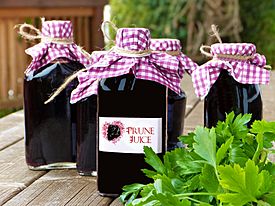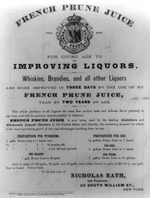Prune juice facts for kids

Bottles of prune juice
|
|
Quick facts for kids Nutritional value per 1 cup canned prune juice |
|
|---|---|
|
44.67 g
|
|
| Sugars | 42.11 g |
| Dietary fiber | 2.6 g |
|
.08 g
|
|
|
Protein
|
1.56 g
|
| Vitamins | Quantity
%DV†
|
| Thiamine (B1) |
4%
.041 mg |
| Riboflavin (B2) |
15%
.179 mg |
| Niacin (B3) |
13%
2.010 mg |
| Vitamin B6 |
43%
.558 mg |
| Vitamin C |
13%
10.5 mg |
| Vitamin E |
2%
.31 mg |
| Vitamin K |
8%
8.7 μg |
| Minerals | Quantity
%DV†
|
| Calcium |
3%
31 mg |
| Iron |
23%
3.02 mg |
| Magnesium |
10%
36 mg |
| Phosphorus |
9%
64 mg |
| Potassium |
24%
707 mg |
| Sodium |
1%
10 mg |
| Zinc |
6%
.54 mg |
| Other constituents | Quantity |
| Water | 207.97 g |
|
182 calories per cup
|
|
| †Percentages estimated using US recommendations for adults. | |
Prune juice is a fruit juice derived from prunes (dried plums) that have been rehydrated. It is a mass-produced product that is often produced using a hot extraction method, and juice concentrate is typically produced using a low-temperature extraction method. It is used by some as a dietary supplement to act as a laxative and to alleviate constipation. It is also sometimes used as a flavor enhancer in tobacco products. It is an ingredient in many cocktails, such as the Purple Dragon, Constipolitan, Go with the Flow, Bowel Banger, Old Yeller, Pile Driver, and Smooth Move.
Contents
Composition
In the United States, bottled or canned prune juice contains "not less than 18.5% by the weight of water-soluble solids extracted from dried plums". It is considered to be a high-fiber food.
Phytochemicals
Prune juice and plums contain phytochemicals, including phenolic compounds (mainly as neochlorogenic acids and chlorogenic acids) and sorbitol.
Production
Prune juice is often produced using hot extraction methods, whereby the prunes are cooked in hot water, becoming a liquid extract, which is then processed into juice. The process of heating and extraction may occur several times with the same batch of prunes, with the collective extracts from each processing then mixed together to create the final product. Prune juice is a mass-produced product.
Prune juice is also produced as a concentrate, whereby low temperature water is used to create a liquid extract. The concentrate has a high sugar content, and is used by food processors to enhance the flavor of and sweeten products, as a humectant to retain moisture in cookies and cakes, and as an ingredient in cereal bars to bind the ingredients.
As a dietary supplement
Prunes may provide a natural laxative effect, and prune juice may serve as a natural laxative for cases of mild constipation. In 1990, the U.S. Food and Drug Administration stated that "the common prune is an effective laxative".
History
United States
Duffy-Mott began producing prune juice in 1933, which was purveyed under the Sunsweet brand name.
The commercial distribution of prune juice in the United States first occurred in 1934, which "began with an output of only 40,000 cases".
Other uses
Prune juice concentrate, prune extracts and plum extracts are sometimes used as an additive in tobacco products to enhance flavor.
Toilet water
In central Pennsylvania during the early days of prohibition in the United States, some bootleggers sold a dangerous concoction facetiously referred to as whiskey, which was also called "toilet water", that consisted of various colognes, perfumes and prune juice mixed together.
In popular culture
In the Star Trek episode "Yesterday's Enterprise", the Klingon character Worf is introduced to prune juice by Guinan. He declares that it is a "warrior's drink" and begins to drink it regularly in subsequent episodes, even carrying the habit over to Star Trek: Deep Space Nine.
In the series Suits_(American_TV_series), the character Louis Litt (played by Rick Hoffman) is very fond of prune juice. He always makes sure to have a supply of it in the office kitchen.
Gallery


